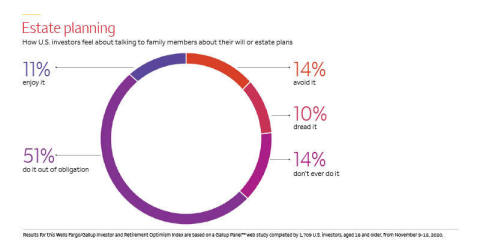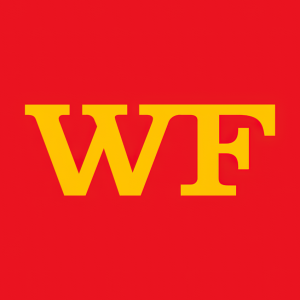Wells Fargo: Pandemic Brings Heightened Awareness to Need for Planning
The latest Wells Fargo/Gallup Investor and Retirement Optimism Index highlights that 45% of investors lack a will or estate plan. While the pandemic has increased awareness, there's a significant communication gap; 65% of investors have not discussed their plans with family. Age plays a role: only 17% of those 65+ lack preparations, compared to 70% of investors under 50. Despite this, 51% approach these discussions as an obligation rather than a preference. The findings suggest a need for greater family communication regarding estate planning.
- None.
- 45% of investors lack a will or estate plan, indicating a significant gap in financial preparedness.
- 65% have discussed their estate plans minimally or not at all with family, signaling poor communication.
- Even among older investors, 17% still lack essential estate planning documents.
Insights
Analyzing...
The global focus on COVID-19 over the past year has caused people to evaluate aspects of financial security that they may have previously put off — most importantly, creating a will and an estate plan. But the Q4 Wells Fargo/Gallup Investor and Retirement Optimism Index shows that while some progress has been made in this area, many investors have more work to do. Close to half of investors in the new survey (

A graphic showing how U.S. investors feel about talking to family members about their will or estate plan. (Graphic: Wells Fargo)
“The pandemic has put in sharp relief the need to plan for the future, including having good end-of-life plans in place,” said Michael Liersch, head of Advice and Planning for Wells Fargo’s Wealth & Investment Management division. “The availability of the vaccine is great news, but it should not stop people from preparing estate plans.”
Higher-income investors are no more prepared than investors as a whole, but the percentage with either a will, estate plans or both does increase with age. The percentage with no preparations declines from
Which of the following do you currently have? |
||||||||
|
A written will (%) |
Written estate plans (%) |
Both (%) |
Neither (%) |
||||
All investors |
34 |
4 |
17 |
45 |
||||
High-income investors |
19 |
6 |
30 |
45 |
||||
Aged 18 to 49 |
19 |
1 |
11 |
70 |
||||
Aged 50 to 64 |
36 |
4 |
17 |
43 |
||||
Aged 65 and older |
50 |
9 |
24 |
17 |
||||
Investors’ assignment in 2021: Close the family communication gap in estate planning
Even those who have a will or estate plan in place may need to be more open about them with family or other heirs, to ensure their final wishes are understood and carried out.
Nearly two-thirds (
Talking to family members about wills and estate plans is not something most investors enjoy. The slight majority (
While most investors (
One reason investors may avoid conversations about their will or estate is that most surveyed say they are confident their family members understand and support their estate plan goals:
“The perception that family members are in sync with their wishes may be true for some investors, but for others, that may need to be confirmed,” said Liersch. “Even if investors want to provide their heirs broad latitude in using their assets, communicating that sentiment now is important to give their heirs peace of mind — and the financial tools and knowledge — in making these decisions when the time comes.”
Investments and Insurance Products: NOT FDIC Insured • NO Bank Guarantee
About the Wells Fargo/Gallup Investor and Retirement Optimism Index
Results for this Wells Fargo/Gallup Investor and Retirement Optimism Index are based on a Gallup Panel™ web study completed by 1,709 U.S. investors, aged 18 and older, from Nov. 9 – 15, 2020. This quarter’s poll includes an oversample of higher-income investors, defined as having
The Gallup Panel is a probability-based, longitudinal panel of U.S. adults who Gallup selects using random-digit-dial phone interviews that cover landline and cellphones. Gallup also uses address-based sampling methods to recruit Panel members. The Gallup Panel is not an opt-in panel. The sample for this study was weighted to be demographically representative of the U.S. investor population, using demographic targets determined from investor samples within prior Gallup national adult surveys. For results based on this sample, one can say that the maximum margin of sampling error is ±5 percentage points at the
In addition to sampling error, question wording and practical difficulties in conducting surveys can introduce error and bias into the findings of public opinion polls.
For this study, the American investor is defined as an adult in a household with stocks, bonds or mutual funds of
The Investor and Retirement Optimism Index has an adjusted baseline score of 100 from when it was established in October 1996. It peaked at +152 in January 2000, at the height of the dot-com boom, and hit a low of -81 in February 2009.
About Wells Fargo Wealth & Investment Management
Wells Fargo Wealth & Investment Management (WIM) is a division within Wells Fargo & Company. WIM provides financial products and services through various bank and brokerage affiliates of Wells Fargo & Company and is one of the largest wealth managers in the U.S., with nearly
Abbot Downing, a Wells Fargo business, and Wells Fargo Private Bank offer products and services through Wells Fargo Bank, N.A. and its various affiliates and subsidiaries. Wells Fargo Bank, N.A. is a bank affiliate of Wells Fargo & Company.
Brokerage services are offered through Wells Fargo Advisors. Wells Fargo Advisors is a trade name used by Wells Fargo Clearing Services, LLC, and Wells Fargo Advisors Financial Network, LLC, Members SIPC, separate registered broker-dealers and non-bank affiliates of Wells Fargo & Company.
Wells Fargo Asset Management (WFAM) is the trade name for certain investment advisory/management firms owned by Wells Fargo & Company. These firms include but are not limited to Wells Capital Management Incorporated and Wells Fargo Funds Management, LLC. Certain products managed by WFAM entities are distributed by Wells Fargo Funds Distributor, LLC (a broker-dealer and Member FINRA).
Wells Fargo Bank, N.A., offers various advisory and fiduciary products and services including discretionary portfolio management. Wells Fargo affiliates, including financial advisors of Wells Fargo Advisors, a separate non-bank affiliate, may be paid an ongoing or one-time referral fee in relation to clients referred to the bank. The bank is responsible for the day-to-day management of the account and for providing investment advice, investment management services, and wealth management services to clients. The role of the financial advisor with respect to bank products and services is limited to referral and relationship management services.
About Wells Fargo
Wells Fargo & Company (NYSE: WFC) is a diversified, community-based financial services company with
Additional information may be found at www.wellsfargo.com | Twitter: @WellsFargo.
News Release Category: WF-ERS
View source version on businesswire.com: https://www.businesswire.com/news/home/20201228005004/en/







